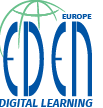
- This event has passed.
No. 4 – Do we develop digital competences or digital skills? – DigCompEdu to balance your way through the storm
June 1, 2021 @ 00:00
Description
However, by the pandemic year, several important instruments describing digital competences of educators already exited, namely, competence metaframeworks, covering knowledge, skill and attitude/ responsibility level, as well as digital competence framework for educators – DigCompEdu – and many others. When the storm surpassed, we have to look around us to reflect on our practices and the way how digital competence development is addressed in education organizations and how this is in line with the competence definition in the broad sense.
Moreover, several important initiatives in the European projects among academics and professionals prepared suggestions on how to address DigCompEdu competence groups and how to match DigCompEdu framework with the competence maturity model. Others raised important questions if digital competence framework is important for educators only, and how student digital competences are to be considered in this perspective.
The webinar dedicated to address these issues will address the challenges and needs that education institutions experience in digital competence development, will look at the proposal of new meta competences as suggestions for DigCompEdu, the maturity model proposal, and will discuss how the pandemic highlighted the need for development of digital competences.
Moderator
 Airina Volungevičienė
Airina Volungevičienė
EDEN Digital Learning Europe,
Vytautas Magnus University
[bookline]
Speakers
 Nicole Johnson
Nicole Johnson
Research Director at the Canadian Digital Learning Research Association
Dr. Nicole Johnson is the Research Director of the Canadian Digital Learning Research Association (CDLRA) (the mission of the CDLRA is to measure the evolution of digital learning at publicly funded post-secondary institutions in Canada and to assess its impact on employment, skills development and digital competencies across the country). Outside of her role with the CDLRA, Nicole is also involved in research studies through Bay View Analytics investigating faculty experiences with digital technology and the impact of the COVID-19 pandemic on online learning in the United States. Additionally, Nicole is part of a research team at Royal Roads University that is exploring the future of higher education. She has experience researching changes in academics’ online participation over time and informal learning experiences among adults in digital contexts related to competency development.
 Jochen Ehrenreich
Jochen Ehrenreich
Senior researcher at DHBW,
Cooperative State University of Baden – Württemberg
Jochen Ehrenreich’s research focuses on HE strategy adaptation to micro-credentials and online learning. At DHBW, he coordinates the work on the Erasmus+ projects EdDiCo, OEPass and MicroHE, with the Learning Passport, the MicroHE meta-data standard, the Credentials Clearinghouse and a Self-Assessment and Recommendation Tool for Educators’ Digital Competences as major outputs. Before joining DHBW, he developed new approaches to technology transfer and lifelong learning at the University of Freiburg, and he was responsible for all study programme accreditation and quality assurance processes at Esslingen University. He holds a master’s degree of Economics and Business Administration from the University of Witten/Herdecke.
 Yasmin Djabarian
Yasmin Djabarian
Program manager at Stifterverband in Berlin
 Anastasia Economou
Anastasia Economou
Joint Research Centre, European Commission
 Stefano Menon
Stefano Menon
Project manager at Fondazione Politecnico di Milano
Stefano Menon’s focus is on innovation of didactics, working transversally with different target groups: from Kindergarten to HE and Lifelong Learning. Graduated in 2000 in Psychology, he has soon started working in the training and educational sector. Since 2004 he has been involved in projects supporting innovation of didactics. He has been working in the academic framework, since 2001. From 2005 to 2012 he worked in METID- Politecnico on elearning and ecollaboration. Since 2012 he has been engaged in Fondazione Politecnico di Milano to design and promote the use of innovative teaching and learning methodologies as a sustainable and effective opportunity, at any level: from kindergarten to vocational and adult lifelong learning. He has a long experience in international projects, starting in 2004 with Life Long Program and being involved currently in many Erasmus+. Project manager, program manager and head of a unit dedicated to digital learning and innovation are some of the roles managed in the years. Strongly interested in the progressive matching between learning needs transformation and competences evolution. Teachers’ trainer on digital learning. He is a member of the Open Education Italia national workgroup.
